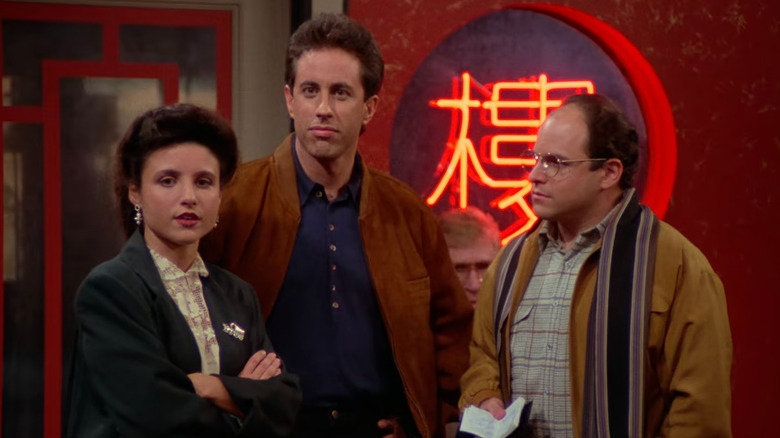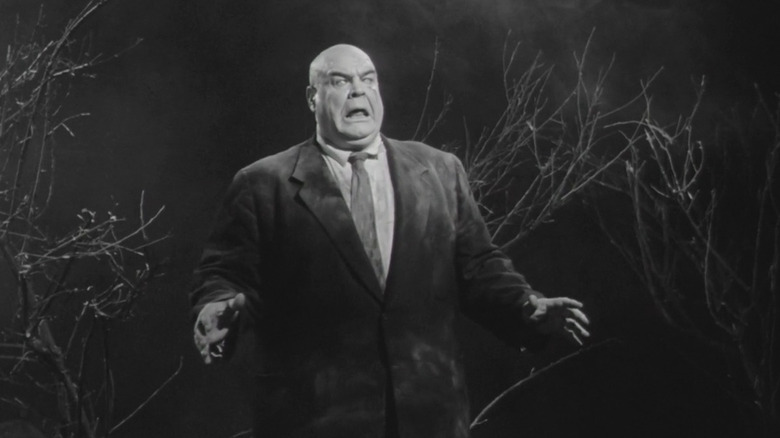Seinfeld's The Chinese Restaurant Could've Been Completely Different If Not For One Change
The difference between a good show and a great show is ingenuity. If you're doing what everyone else is doing, there's nothing inherently wrong with sticking to what works. But when you push beyond the conventions, that's when the magic happens, and "Seinfeld" had plenty of it. The hit NBC sitcom about a chaotic group of inconsiderate friends living in New York forged its path to becoming one of the best sitcoms of all time by thinking outside the box. It caused a ripple effect throughout the world of television comedy that lasted for years, impacting shows like "It's Always Sunny in Philadelphia" and "Curb Your Enthusiasm."
For as treasured as the series is today, "Seinfeld" wasn't an instant phenomenon. It had to slowly grow its identity and fanbase over the course of its first few seasons until "The Contest" cemented the show as must-watch television. The episode where you can really start to see the dexterity of Larry David and Jerry Seinfeld's premise is in season 2 with "The Chinese Restaurant." It's considered one of the series' best episodes in part because it broke from the sitcom formula with a simple idea.
Everyone's experienced some form of waiting for a table and feeling an internal jealousy when it seems like other groups are being seated before you. In this episode, Jerry (Jerry Seinfeld), Elaine (Julia Louis-Dreyfus), and George (Jason Alexander) find themselves in a similar predicament at a local Chinese restaurant, and it's a truly hilarious half-hour of television. All sense of a sitcom narrative is upended for an experience akin to waiting for the show to start, but it never does in the traditional sense. (Well, there's that and the one-two punch of "for 50 bucks, I'd put my face in their soup and blow" and a frustrated George yelling "we live in a society!")
We can laugh about the episode in hindsight, but when it came time to pitch it, issues arose from a number of different parties. For one, Michael Richards initially felt like he was being written out of the show, considering this was the first episode (barring the pilot) without the core four ensemble. David says he didn't include Kramer because the character didn't go out, which is true at the time, but I like to think it's because, for as much as he is a total weirdo, Kramer can be a people person and likely would have befriended James Hong's maître d' character.
Before "The Chinese Restaurant" made it to air, however, there were concerns from the top brass at NBC regarding nothing happening, which prompted the writers to introduce a small but crucial conflict.
A ticking clock to see Plan 9 from Outer Space was added to create stakes
In a featurette for "The Chinese Restaurant," NBC executive Warren Littlefield recounts being confounded by the script and it's supposed lack of dramatic momentum:
"I read that script, and I went 'nothing happens. Am I missing pages?' Literally, they go to the restaurant, they stand around, they can't get a table. Nothing happens. Are they trying to save money? I didn't get it."
I suppose that says everything about Littlefield's lack of vision when confronted with a very simple idea that, as Louis-Dreyfus puts it, comes across like a play. Nevertheless, series writer Larry Charles decided to implement a ticking clock element in the last 10 minutes about the trio having to make it to a one-night screening of "Plan 9 from Outer Space," the cult hit from Edward D. Wood Jr. "This isn't plans one through eight. This is 'Plan 9.' This is the one that worked, the worst movie ever made," argues Jerry.
The desperation of being incredibly hungry and impatient sure sounds like more than enough to propel the urgency of this one-location episode. But if you have to calm the suits, I suppose being late for a movie adds just enough tension to let the premise slide. (As for the "worst movie ever made" jab, allow me to channel my inner Dakota Johnson and say that's not true, Jerry.)
"Plan 9" received its overblown decoration by film critic Michael Medved and his brother Harry in their 1980 book "The Golden Turkey Awards," which ran the gamut of supposed bad movies. Is the sci-fi horror movie barely held together with scotch tape, shoddy production design, and nonsensical editing? You bet it is. But that's what makes it so charming. It was crafted with love, even though Wood barely had the funds to make it to begin with. Through a contemporary lens, "Plan 9" has passion and a voice, which is more than I can say for a lot of other movies that have unlimited resources at their disposal and utterly waste them.
Every episode of "Seinfeld" is currently streaming on Netflix.

